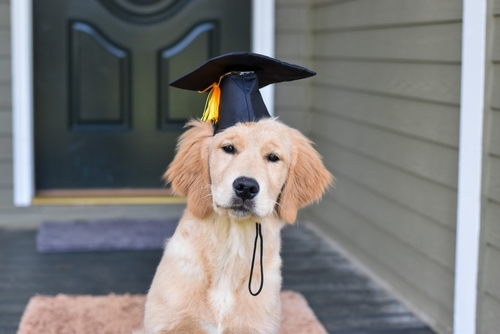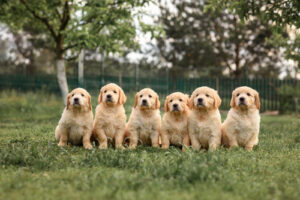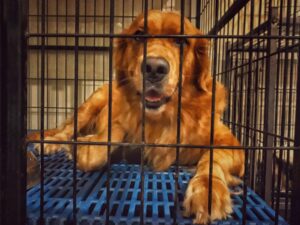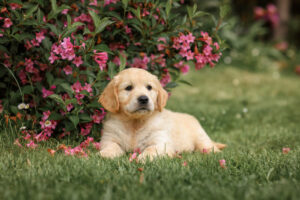Golden Retrievers are one of the most intelligent and trainable dog breeds, making them an excellent choice for families and first-time pet owners alike. However, proper training during their puppy stage is critical to ensure they grow into well-mannered and happy adults. If you’ve recently welcomed a Golden Retriever puppy into your home, here’s a comprehensive guide to essential training tips tailored for this lovable breed.
1. Start Training Early
Golden Retriever puppies are like sponges, soaking up information quickly during the first few months of life. The ideal time to start training is as soon as you bring your puppy home, typically around 8 weeks old. Early training establishes a foundation of trust and respect, making it easier to teach more advanced commands later.
Focus on basic commands such as:
Sit
Stay
Come
Down
Short, consistent sessions (5–10 minutes) are best for young puppies to keep them engaged without overwhelming them.
2. Positive Reinforcement is Key
Golden Retrievers are eager to please, and they respond exceptionally well to positive reinforcement. Reward-based training using treats, praise, or toys encourages your puppy to repeat good behavior.
Tips for Effective Positive Reinforcement:
Use small treats that are easy to chew and won’t interrupt training.
Deliver rewards immediately after the desired behavior.
Pair treats with verbal praise, like “Good boy!” or “Good girl!”
Avoid punishment or harsh corrections, as they can lead to fear or anxiety in your puppy. Goldens thrive in environments where training is fun and rewarding.
3. Focus on Socialization
Golden Retrievers are naturally friendly, but proper socialization is still essential to prevent fear or aggression later in life. Expose your puppy to a variety of people, pets, environments, and experiences between 8 and 16 weeks of age.
Socialization Ideas:
Invite friends and family over to meet your puppy.
Introduce them to other well-behaved dogs in a controlled setting.
Take your puppy on short trips to dog-friendly places like parks or pet stores.
Expose them to everyday sounds such as vacuums, doorbells, and car rides.
Socialization helps your puppy develop confidence and adaptability, ensuring they grow into a well-rounded adult.
4. Crate Training for a Safe Space
Crate training is an excellent tool for Golden Retriever puppies. A crate provides a safe and comfortable space for your puppy to relax and helps with housebreaking.
Crate Training Tips:
Choose a crate that’s large enough for your puppy to stand, turn, and lie down comfortably.
Introduce the crate gradually, making it a positive experience with treats and toys.
Never use the crate as a form of punishment.
Most Golden Retrievers adjust quickly to crate training, making it a helpful tool for managing behavior and ensuring safety.
5. Potty Training Made Simple
Housebreaking your Golden Retriever puppy is one of the first challenges you’ll face. Luckily, with consistency and patience, Goldens pick up potty training quickly.
Steps for Effective Potty Training:
Set a Routine: Take your puppy outside frequently, especially after meals, naps, and playtime.
Designate a Spot: Choose one area in your yard for potty breaks to create a familiar routine.
Reward Success: Praise and reward your puppy immediately after they go in the correct spot.
Monitor Closely: Supervise your puppy indoors to prevent accidents and recognize signs that they need to go (e.g., sniffing or circling).
Accidents will happen, but avoid punishment and focus on reinforcing good habits.
6. Teach Bite Inhibition
Puppies explore the world with their mouths, and biting during play is a natural behavior. However, it’s crucial to teach your Golden Retriever puppy bite inhibition to prevent unwanted nipping as they grow older.
Tips for Reducing Biting:
Redirect Chewing: Provide plenty of chew toys to satisfy their teething needs.
Use Time-Outs: If your puppy bites too hard during play, let out a high-pitched “ouch” and stop playing immediately.
Reward Gentle Behavior: Praise and reward your puppy when they play without using their teeth.
Goldens are quick learners, so consistent training will help them understand boundaries.
7. Leash Training for Happy Walks
Golden Retrievers are an active breed, so leash training is a must for enjoyable walks. Teaching your puppy to walk on a leash without pulling ensures a pleasant experience for both of you.
Steps for Leash Training:
Start Early: Introduce the leash indoors before moving to outdoor walks.
Use Positive Reinforcement: Reward your puppy for walking beside you without pulling.
Stop and Redirect: If your puppy pulls, stop walking and wait for them to return to your side before continuing.
Practice makes perfect, and with time, your Golden will master leash manners.
8. Prevent Jumping Behavior
Golden Retrievers are known for their exuberance, and jumping on people is a common issue. While it may be cute in a puppy, it can become problematic as they grow larger.
How to Stop Jumping:
Ignore your puppy when they jump and reward them for sitting calmly instead.
Teach the “off” command and use it consistently when they try to jump.
Ask visitors to help enforce the rule by not rewarding jumping with attention.
Consistency across all family members and guests is crucial for curbing this behavior.
9. Mental Stimulation is Essential
Golden Retrievers are highly intelligent and require mental stimulation to prevent boredom and destructive behavior. Incorporating puzzles, games, and training into your puppy’s routine keeps their minds sharp and engaged.
Ideas for Mental Stimulation:
Use puzzle toys or treat-dispensing toys.
Teach new tricks beyond basic commands.
Rotate toys regularly to keep them exciting.
Mental enrichment not only keeps your Golden entertained but also strengthens the bond between you and your puppy.
10. Be Patient and Consistent
Training a Golden Retriever puppy requires time, patience, and consistency. Goldens are eager to learn, but each puppy is unique and may progress at their own pace. Celebrate small victories and remain patient through challenges.
Key Takeaways for Consistent Training:
Use the same commands and cues across all family members.
Stick to a daily training schedule to build routine and trust.
Focus on reinforcing good behavior rather than punishing mistakes.





